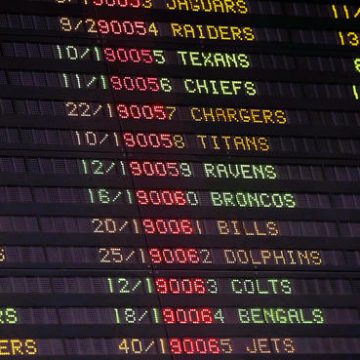
Since the U. S. Supreme Court overturned the Professional and Amateur Sports Protection Act (PASPA) of 1992 back in May, the free-for-all has begun regarding the states offering sports betting. Both live and online, states are opening sports betting operations for their citizens, but one thing hasn’t been swept up in the rush. While there is a surge of states offering the once verboten opportunity to bet on sports, online casino gaming and poker haven’t been coming along for the ride.
Rhode Island: Enough Action to Open Up
Rhode Island is one step away from entering the fraternity of sports betting states in the U. S. Last Wednesday, the Rhode Island Senate approved the state’s 2019 budget, complete with $23.5 million expected in revenues from a regulated sports betting industry. All that is necessary for Rhode Island to become the fourth state to enact regulations on the industry is the signature of Governor Gina Raimondo, who was expected to sign the legislation.
Live sports betting will take place in The Ocean State’s two Twin River casinos, with the betting software provided by IGT. IGT also is responsible for the operation of the state’s lottery. While it might not be thought that Rhode Island will generate a great deal of revenues, $14.75 million is expected to go to IGT and the casinos take will be around $8 million, with wagers coming in to the two casinos of slightly more than $900 million. The first bets aren’t expected to be registered in Rhode Island until October, however.
Mississippi Joins the Game
While Rhode Island passed their law first, Mississippi will officially become the fourth state to accept sports bets in their state. Last year, politicians in Jackson amended their state regulations on gaming to include sports betting, with the provision that the bets be placed in one of the state’s casinos. Those regulations were put on hold until the Supreme Court’s decision on PASPA opened sports betting for individual states and allowed Mississippi to move forward.
“We’ve been exploring options and locations for at least the past two months expecting it (the SCOTUS decision) to happen,” Golden Nugget general manager Chett Harrison told the Biloxi Sun Herald. “It’s definitely going to be a good boost for Mississippi.” It is expected that the first bets will be placed in Mississippi by the end of July, but no estimates have been made on what revenues will come in for the Magnolia State’s coffers.
No Go in 2018 for New York
Although success can be claimed in Rhode Island and Mississippi, the big prize of New York is going to have to wait a bit. Wednesday was the end of the legislative session and, although there was sports betting legislation in both houses in Albany, neither body’s leader wanted to pull the trigger and bring up a vote. With the close of the legislative session, it means that New York – with its 20 million citizens – will not be able to offer sports betting to its constituents.
What New York legislators will get is an example of how much money the Empire State is going to lose in the next six months. With New Jersey’s sports betting windows open for business – and mobile betting coming soon – and Pennsylvania’s online casino gaming and poker industry opening later this summer, New York is going to miss out on millions in revenues. Thus, it is thought that Albany’s legislators will quickly pass sports betting regulations in 2019.
But What About…
One thing that isn’t in the discussions regarding sports betting (and there are several other states considering passage of regulations, including Massachusetts and Michigan) is online casino gaming and poker. Once thought to potentially ride the coattails of sports betting into law, it doesn’t appear that this is the case. In New York, online poker regulation passed in the last two legislative sessions but wasn’t even under consideration in 2018.
Why aren’t the legislatures looking at both options? Perhaps it is something as simple as perception. Sports betting is a billion-dollar industry that is an “acceptable” form of gambling (and if you don’t think so, go talk to whoever won your NCAA pool this spring). Sports betting is something that has become common in the world; casino gaming and poker, whether live or online, still have a stigma attached to them.
And what about other states? It was suggested after the SCOTUS decision that, within five years, more than half the country would have regulated sports betting. In only the first two months since the SCOTUS decision was rendered, the number of states has gone from one (Nevada) to five (Delaware, New Jersey, Rhode Island and Mississippi) and shows no signs of slowing down.















